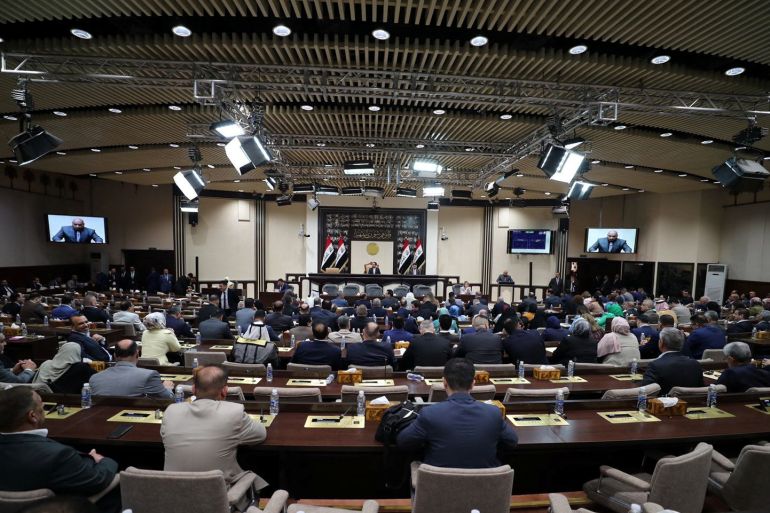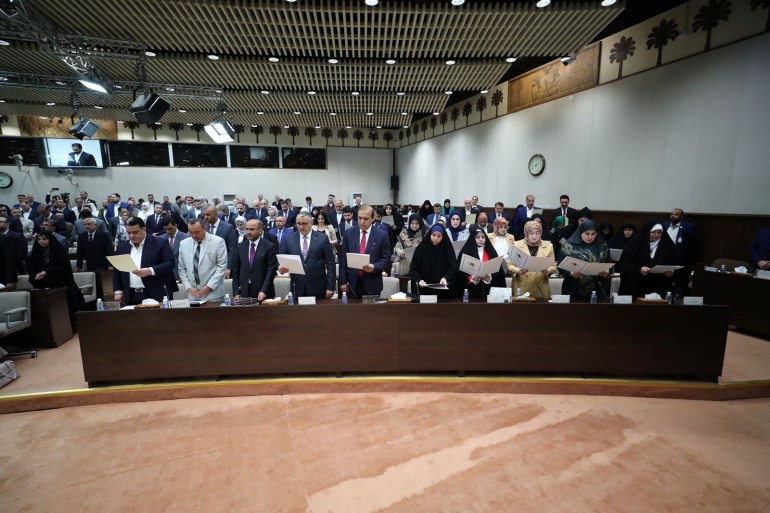Iraq parliament swears in new members after dozens walk out
Seventy-three legislators resigned collectively earlier in June after a prolonged political impasse over the formation of the next government.

Iraq’s parliament swore in dozens of new legislators on Thursday, replacing 73 who were loyal to powerful Shia leader Muqtada al-Sadr and strengthening the power of rival Iran-backed Shia factions in the assembly.
Iraq was plunged deeper into political crises on June 12 when 73 legislators from al-Sadr’s bloc, then the biggest in parliament, quit en masse in a bid to break a logjam over the establishment of a new government.
Keep reading
list of 4 itemsSadrists quit Iraq’s parliament, but al-Sadr isn’t going away
Iraqi MPs from Muqtada al-Sadr’s bloc resign
Iraq’s Kurdish female entrepreneurs overcome barriers to succeed
The legislature had already been in turmoil since October’s general election, amid intense negotiations between political factions that failed to forge a majority in support of a new prime minister to succeed Mustafa al-Kadhimi.
Following the mass resignation, the seats defaulted to candidates with the second highest number of votes during October’s polls.

Although he emerged as a winner, al-Sadr has been locked in a power struggle with internal Shia rivals backed by Iran, and was unable to cobble together a coalition that could form a majority government.
According to Iraqi laws, if any seat in parliament becomes vacant, the candidate who obtains the second highest number of votes in their electoral district would replace them.
In this case, it made al-Sadr’s opponents from the so-called Coordination Framework, a coalition led by Iran-backed Shia parties and their allies, the majority with about 122 seats.
It puts al-Sadr out of parliament for the first time since 2005, and allows pro-Iranian factions to determine the makeup of the next government.
“Today, the first step has been completed, which is the replacement deputies taking the oath,” said legislator Muhammad Saadoun Sayhod from the Rule of Law coalition.
“We will now start the process of electing the president and naming the prime minister from the Coordination Framework,” he said, adding he expected the formation of a new government to begin soon.
No immediate reaction was available from al-Sadr to the swearing-in of new legislators.
‘Sectarian pressures’
On Wednesday, al-Sadr accused Iranian proxies of political meddling and applying pressure against newly elected political independents and allies of his Sadrist bloc. He called on parliamentarians not to succumb.
“I call on blocs to stand bravely for the sake of reform and saving the nation, and not to give in to sectarian pressures, as they are bubbles which will disappear,” he said in a statement.
Munaf al-Musawi, a political analyst and director of the Baghdad Center for Strategic Studies, said the fight for government posts will now begin. Once a government is formed, he said al-Sadr’s supporters could take to the streets, leading to clashes with Shia rivals.
“What comes next is more difficult,” al-Musawi said.
With Coordination Framework and its allies now in control of parliament, al-Sadr and his allies will pay the price for their walkout, he added.
Iraq’s election was held several months earlier than expected, in response to mass protests that broke out in late 2019 and saw tens of thousands rally against endemic corruption, poor services and unemployment.